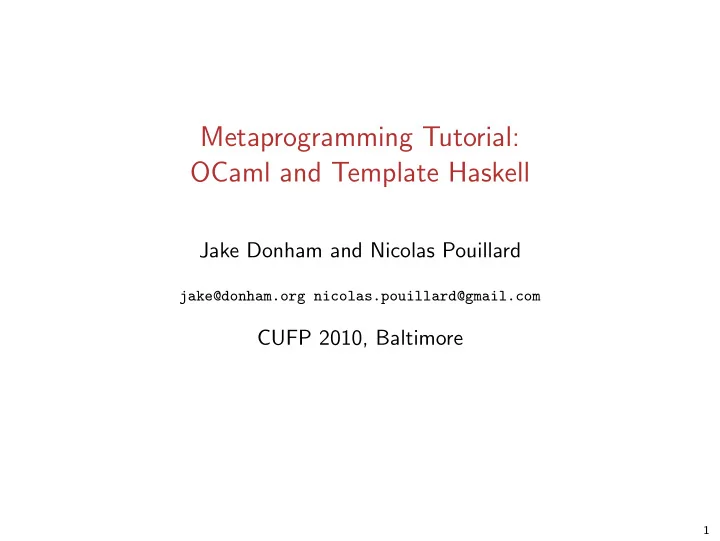

Metaprogramming Tutorial: OCaml and Template Haskell Jake Donham and Nicolas Pouillard jake@donham.org nicolas.pouillard@gmail.com CUFP 2010, Baltimore 1
Static metaprogramming What is it? compile-time code generation transformation of syntax trees What’s it good for? for convenience (generate boilerplate or type-derived functions) for speed (generate first-order functions from higher-order templates) for EDSLs (embedded regexps or SQL) for language extensions 2
Static metaprogramming in OCaml and Haskell Camlp4: preprocessing front-end to the OCaml compiler, AST transformations written as Camlp4 plugins Template Haskell: compiler extensions to GHC, AST transformations embedded in Haskell code 3
Small example: map over a tuple Avoid boilerplate of mapping over elements of a tuple in OCaml, Tuple.map f (a, b, c, d) is transformed to (f a, f b, f c, f d) in Haskell, import qualified Data.Tuple.TH as T $(T.map 4) f (a,b,c,d) is transformed to (f a, f b, f c, f d) 4
Camlp4 5
ASTs in Camlp4: type expr = ... and patt = ... and ctyp = ... and str_item = ... and ... e.g. ExInt for an int expr, TySum for a sum type see Camlp4Ast.partial.ml for full def somewhat loose—easy to make invalid AST converted to OCaml AST; see Camlp4Ast2OCamlAst.ml for errors 6
OCaml quotations: a way to work with the AST using concrete syntax you can always fall back to AST constructors! e.g. <:expr< 1, 2 >> becomes ExTup (_, (ExCom (_, (ExInt (_, "1")), (ExInt (_, "2"))))) <:ctyp< int * int >> becomes TyTup (_, (TySta (_, (TyId (_, (IdLid (_, "int")))), (TyId (_, (IdLid (_, "int"))))))) antiquotations: <:expr< 1, $x$ >> , <:expr< 1, $‘int:x$ >> see doc page of quotations / antiquotations 7
Working with the AST: Ast.map object that maps over AST method for each syntactic class override to operate on AST locations, Ast.Loc.t stores filename and position must provide one to construct AST nodes quotations use _loc by default Loc.ghost Ast.loc_of_expr e <:expr@_loc< >> <:expr@here< >> 8
Revised syntax: alternative concrete syntax for OCaml fixes some infelicities in OCaml syntax makes antiquotation easier (gives more context, bugs with original syntax) list t instead of t list match [ patt -> expr | ... ] instead of match patt -> expr | ... True instead of true see doc page for full details 9
Running Camlp4: camlp4of [module.cmo]* [file.ml] show loaded modules: -loaded-modules print original syntax: -printer o show AST for debugging: -filter Camlp4AstLifter take input from command line: -str [input] Ex. camlp4of -printer o -filter Camlp4AstLifter \ -str ’type t = Foo’ 10
Debugging: don’t know what AST to use? run example through camlp4of to see what AST is parsed quotations / antiquotations don’t work? read parsers :( to see why ( Camlp4OCamlRevisedParser.ml , Camlp4OCamlParser.ml ) fall back to AST constructors errors converting Camlp4 to OCaml AST? read converter to see why ( Camlp4Ast2OCamlAst.ml ) use -filter Camlp4AstLifter to see what you’re generating 11
Template Haskell 12
ASTs in Template Haskell TH exposes data-types for expressions, patterns, declarations, types... (Exp, Pat, Dec, Type). exE :: Exp exE = ListE [_42, VarE ’succ ‘AppE‘ _42] where _42 = LitE (IntegerL 42) 13
Smart constructors, new names, and the Q monad TH also exposes smart constructors for all constructors, to build programs in the Q monad. apE :: ExpQ apE = do x <- qNewName "x" y <- qNewName "y" lamE [varP x, varP y] (varE x ‘appE‘ varE y) 14
Generic quotations in Template Haskell TH has a general mechanism for quotations. [$sql| SELECT * FROM ‘users‘ |] [$regex| (a|b)*b*(a|b)* |] [$xml| <person><name>Foo</name><age>42</age></person> |] 15
Haskell quotations in TH TH has a general mechanism for quotations. [e| \f g x -> f (g x) |] [t| Int -> (Bool, Char) |] [d| data Foo = A | B | C |] 16
... and antiquotions for those Using $(...) one can splice expressions, types... into one other. [e| case $(a) of { [] -> $(b) ; x:xs -> $(c) x xs } |] [t| Int -> ($(t), Char) |] [d| data Foo = A | B $(t) | C |] 17
Exercises 18
Tuple map Implement the tuple map syntax from the example. 19
Zipper types The ”zipper” representation of a value of type t is a subtree of type t , and a context of type t’ , where t’ is derived systematically from t . (see Huet) A zipper type has: a Top arm for each arm containing t , an arm for each occurrence of t with that occurrence replaced with t’ For example: type t = Leaf | Tree of t * t has zipper type type t’ = Top | Tree0 of t’ * t | Tree1 of t * t’ Implement a generator for zipper types. 20
Implementing quotations/antiquotations in Camlp4 Quotations are implemented in several phases: quotation is lexed to a QUOTATION token containing tag and body as strings expander for tag is looked up according to parse context (e.g. expr vs. patt ) expander parses string to quotation AST with FooAnt nodes for antiquotations, containing tag and body expander lifts quotation AST to Camlp4 AST according to parse context expander parses antiquotation nodes as OCaml and applies conversions according to tag 21
JSON quotations in OCaml We can define quotations for JSON: <:json< [ 1, 2, 3 ] >> <:json< { "foo" : true, "bar" : 17 } >> And antiquotations: <:json< [ 1, $int:x$, 3 ] >> <:json< { "foo" : $bool:b$, "bar" : 17 } >> <:json< [ 1, $list:y$, 3 ] >> 22
JSON quotations in Haskell We can define quotations for JSON: [$json| [ 1, 2, 3 ] |] [$json| { "foo" : true, "bar" : 17 } |] And antiquotations: [$json| [ 1, $(js x), 3 ] |] [$json| { "foo" : $(js b), "bar" : 17 } |] [$json| [ 1, $(js y), 3 ] |] Implement JSON quotations and antiquotations. 23
Recommend
More recommend